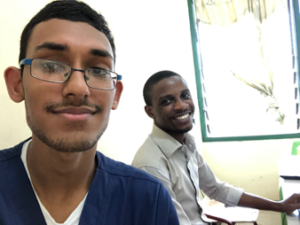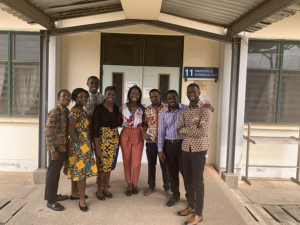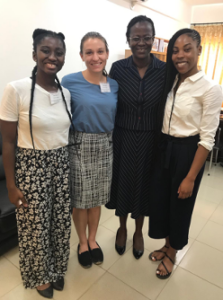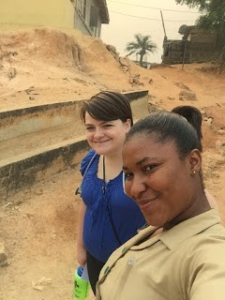Every year, dozens of students and trainees head to Ghana to participate in CFHI’s Hospital Medicine in Coastal Ghana program, where they are immersed in a new culture while participating in observational clinical rotations at the Cape Coast Teaching Hospital under the supervision of a team of local preceptors. This post chronicles the experience of four CFHI trainees who participated in this program in 2019 and 2020. During their time in Ghana, they shadowed medical professionals in various departments within the hospital, visited historic landmarks, and broadened and enriched their medical and socio-cultural knowledge.
Shashank Singh

Shashank Singh, an Undergraduate Environmental Public Health student at Ohio State University, rotated in four different departments at the Cape Coast Teaching Hospital. This experience gave him a great introduction to the Ghanaian healthcare system and its many different facets. He noticed that lack of access to clean water was a recurring problem within the hospital, and this disparity made Shashank realize that water quality is an urgent public health issue that still afflicts many regions of the world and helped to deepen his understanding of determinants of health. He also got the chance to participate in an outbreak event where he accompanied local healthcare workers into the community to provide pop-up clinic services and assisted in health education campaigns. He thought that going into the community was a great intervention and appreciated the opportunity to learn about locally-based initiatives to provide care to those who usually do not have access to health care.
Ka’la Drayton
 Ka’la Drayton is a fourth-year medical student at the Medical University of South Carolina. During her first couple of weeks at the Cape Coast Teaching Hospital, Ka’la rotated in both the OB/GYN and internal medicine departments. During her rounds with OB/GYN specialists, she shadowed local healthcare professionals as they tended to emergency room visits, cesarean sections, removal of fibroids, ovarian cancer treatments, and more. While rotating in the internal medicine department, Ka’la was able to witness a variety of different cases such as a hemorrhagic stroke, Mallory-Weiss tear, cirrhosis, spontaneous bacterial peritonitis, and HIV encephalopathy. Her experience gave her a better understanding of the local and global burden of disease as well as how communities are able to remain resilient despite scant resources and innovate to address local issues such as sanitation, water supply, and electrical outages. Ka’la wrote, “Though their resources are limited they know exactly what to do and how to do it but unlike home, all of those things aren’t laid out beautifully in our Pyxis bin.” Learning more about the healthcare system in a different country allowed Ka’la to compare and contrast her experiences with those in America.
Ka’la Drayton is a fourth-year medical student at the Medical University of South Carolina. During her first couple of weeks at the Cape Coast Teaching Hospital, Ka’la rotated in both the OB/GYN and internal medicine departments. During her rounds with OB/GYN specialists, she shadowed local healthcare professionals as they tended to emergency room visits, cesarean sections, removal of fibroids, ovarian cancer treatments, and more. While rotating in the internal medicine department, Ka’la was able to witness a variety of different cases such as a hemorrhagic stroke, Mallory-Weiss tear, cirrhosis, spontaneous bacterial peritonitis, and HIV encephalopathy. Her experience gave her a better understanding of the local and global burden of disease as well as how communities are able to remain resilient despite scant resources and innovate to address local issues such as sanitation, water supply, and electrical outages. Ka’la wrote, “Though their resources are limited they know exactly what to do and how to do it but unlike home, all of those things aren’t laid out beautifully in our Pyxis bin.” Learning more about the healthcare system in a different country allowed Ka’la to compare and contrast her experiences with those in America.
Even though Ka’la is a trainee from the US, she felt right at home in Ghana. She wrote, “I went from being the only African American during rounds in America to now being the only African American amongst Ghanaians here, and it’s life-changing. Being among people who look like me and are treating people who look just like them, made me so proud.” The local healthcare professionals and staff made her feel very welcomed, shared stories, and bonded over how they share the same issues when it comes to getting consults or referrals from other hospitals.
Kristin Forkapa

Kristin Forkapa is a fourth year medical student at Ohio University Heritage College of Osteopathic Medicine. During her program in Ghana, she spent two weeks in the pediatric ward and two weeks in the internal medicine ward. Kristin noticed many differences in the healthcare system between Ghana and the US. For example, she noted that in Ghana, one pays for treatment before receiving care, whereas in the US, care is administered first and then the bill comes after. She also noticed that the relationships between students/residents and attending physicians is much more relaxed in Ghana and has forged lasting friendships with her mentors and fellow trainees.
Her CFHI experience allowed Kristin the chance to learn the history of Ghana and culturally immerse herself in the local community. On a weekend trip, Kristin visited the Cape Coast Castle — an important landmark in Ghana and where roughly 214 million Africans had been held during the slave trade. A lot of her free time was spent going to the local markets almost daily or visiting her friends family members who live in Ghana. She particularly enjoyed the food – especially the jollof, kenkey, stew, and kebabs.
Jerica Gibson

Jerica Gibson is a Medical Student at Philadelphia College of Osteopathic Medicine. She spent one week in Internal Medicine, one week in a CHPS compound (Community-Based Health Planning and Service) and two weeks in the Pediatric Ward at Cape Coast Teaching Hospital. During her time at the CHPS compound, she shadowed the local staff on family planning sessions, general consultations, and pediatric check-ups and vaccination. While shadowing residents in Internal Medicine, she came across many ailments such as Deep Vein Thrombosis (DVTs), Malaria, HIV, and Meningitis. This was a new experience for her, as the U.S. has a very different burden of disease and many of these communicable diseases are less present.
Jerica also visited the Cape Coast Castle where she was able to learn about the history of Ghana during the 1600s. In her blog she writes: “It shed light on the slave trade from a different perspective that is not often taught appropriately in the US.” Seeing the Cape Coast Castle in person was very impactful for her and allowed her to learn a lot more about the transatlantic slave trade from a different viewpoint.
Like other CFHI participants in Cape Coast, Jerica witnessed and confronted challenges within the healthcare system such as unsafe water quality, lack of hospital funding, and inadequate access to health services. As someone who has spent a lot of time advocating for better healthcare in the US, this experience opened her eyes to the inequalities that exist elsewhere too. She hopes to continue learning and advocating not just for equality of healthcare in the US, but around the world.
While each participant’s experience is different, CFHI global health programs in Ghana provide a rare chance for students and trainees in the health and medicine fields to learn and experience what health looks like in a different context and learn from local health leaders while culturally immersing in the communities that they serve. Participants emerge from their programs with a better understanding of health and its determinants, a network of peers and mentors, and a deepened sense of self and service.
CFHI’s programs in Ghana are now being offered virtually- check out virtual internships and virtual practicums here. All of CFHI’s Virtual Opportunities can be found here: https://www.cfhi.org/virtual-opportunities
